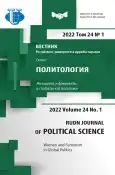How Can UN Digital Policy Enable the Rights of Women?
- Autores: Leenders A.R.1,2
-
Afiliações:
- University of Sofia
- Moscow State Institute of International Relations (MGIMO University)
- Edição: Volume 24, Nº 1 (2022): Women and Feminism in Global Politics
- Páginas: 53-63
- Seção: FEMINISM AS AN IDEOLOGY AND CONCEPTUAL BASE FOR POLITICS
- URL: https://journal-vniispk.ru/2313-1438/article/view/322590
- DOI: https://doi.org/10.22363/2313-1438-2022-24-1-53-63
- ID: 322590
Citar
Texto integral
Resumo
In most academic discourses, United Nations (UN) programs and initiatives to promote digitalization and women’s rights are studied as distinct fields. Less attention has been paid to UN efforts to promote gender equality and protect women’s rights by promoting digitalization. The article addresses some of the gaps in the contemporary research of the role of modern international intergovernmental organizations in women’s rights protection amidst modern technological development. The study reveals the influence of digitalization on ameliorating the position of women in modern societies and formulates the assessment of the gender gap in using the ICT technologies, as well as analyzes how UN specialized divisions act to ensure digital gender equality. The author concludes that the Sustainable Development Goals (SDGs) approved by the UN in 2015 do not pay enough attention to the importance of digitalization for ensuring the rights of women.
Palavras-chave
Sobre autores
Anna Maria Leenders
University of Sofia; Moscow State Institute of International Relations (MGIMO University)
Autor responsável pela correspondência
Email: amrada4@mail.ru
ORCID ID: 0000-0001-7356-1456
MSc in Political Science of the Columbia University, lecturer of the University of Sofia, postgraduate of the MGIMO University
Sofia, Republic of Bulgara; Moscow, Russian FederationBibliografia
- Alves, J.E.D. (2016). Desafios da equidade de gênero no século XXI. Revista Estudos Feministas, 24(2), 629-638. https://doi.org/10.1590/1805-9584-2016v24n2p629
- Arat, Z.F.K. (2015). Feminisms, Women’s Rights, and the UN: Would Achieving Gender Equality Empower Women? American Political Science Review, 109(4), 674-689. https://doi.org/10.1017/s0003055415000386
- Dhar, S. (2018). Gender and Sustainable Development Goals (SDGs). Indian Journal of Gender Studies, 25(1), 47-78. https://doi.org/10.1177/0971521517738451
- Gilleri, G. (2020). ‘How are you actually doing, ladies?’ Indicators of gender equality through the lens of the UN Committee on the Elimination of Discrimination against Women. International Journal of Human Rights, 24(8), 1218-1246. https://doi.org/10.1080/13642987.2020.1717474
- Girard, M. (2020). We Need Standards for Digital Cooperation to Occur. IEEE Technology and Society Magazine, 39(2), 68-74. https://doi.org/10.1109/MTS.2020.2991501
- Herr, R.S. (2019). Women’s Rights as Human Rights and Cultural Imperialism. Feminist Formations, 31(3), 118-142. https://doi.org/10.1353/ff.2019.0033
- Kim, E.M. (2017). Gender and the Sustainable Development Goals. Global Social Policy, 17(2), 239-244. https://doi.org/10.1177/1468018117703444
- Kleinwächter, W., Kettemann, M.C., & Senges, M. (Eds.). (2019). Towards a Global Framework for Cyber Peace and Digital Cooperation: An Agenda for the 2020s. Hamburg: Verlag Hans-Bredow-Institut.
- Leenders, A.M. (2020). International relations and technological conditionality. The Caspian Region: Politics, Economics, Culture, 1, 96-104. https://doi.org/10.21672/1818-510X-2020-62-1-096-104 (In Russian).
- Leenders, A.M., & Grishin, N. (2020). United Nations institutions for the development of digital cooperation. Political Expertise: POLITEX, 16(4), 493-504. https://doi.org/10.21638/spbu23.2020.405 (In Russian).
- MacPhail, F. (2017). Progress of the world’s women 2015-2016: transforming economies, realizing rights, by UN Women. Canadian Journal of Development Studies/Revue canadienne d’études du développement, 38(2), 1-3. https://doi.org/10.1080/02255189.2017.1303366
- McQuigg, R. (2018). Is it time for an UN treaty on violence against women? The International Journal of Human Rights, 22(3), 305-324. https://doi.org/10.1080/13642987.2017.1359552
- Popova, O.V., Maslova, A.E., & Agapitova, M.I. (2016). Problems of reproductive health of women and abortions in programs of the Russian political parties. The Woman in the Russian society, 4(81), 72-84. https://doi.org/10.21064/WinRS.2016.4.6 (In Russian).
- Prestes, E. (2019). An Overview of the United Nations High-Level Panel on Digital Cooperation. IEEE Robotics & Automation Magazine, 26(1), 103-104. https://doi.org/10.1109/MRA.2019.2891183
- Renzulli, I. (2017). ‘Women and peace’: A human rights strategy for the women, peace and security agenda. Netherlands Quarterly of Human Rights, 35(4), 210-229. https://doi.org/10.1177/0924051917737912
- Sandler, J., & Goetz, A.M. (2020). Can the United Nations deliver a feminist future? Gender & Development, 28(2), 239-263. https://doi.org/10.1080/13552074.2020.1753432
- Zipoli, D. (2019). NHRI Engagement with UN Human Rights Treaty Bodies: A Goal-based Approach. Nordic Journal of Human Rights, 37(3), 259-280. https://doi.org/10.1080/18918131.2019.1682241
Arquivos suplementares









